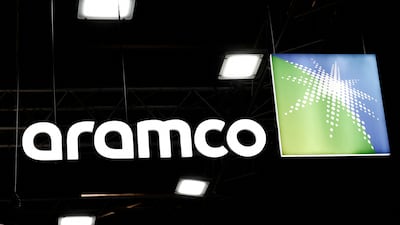Saudi Arabia has announced plans to sell shares in its oil company Aramco, in a deal that could raise as much as 44.8 billion Saudi riyals ($11.9 billion), as the kingdom continues with its economic diversification plans.
The government will sell 1.545 billion shares in Saudi Aramco, or 0.64 per cent of the company’s issued shares, with the offering set to begin on June 2, a statement said on Thursday.
The sale is expected to close on June 11, with the price range expected to be between 26.70 and 29 riyals a share, Aramco said.
Aramco's shares closed at 29.1 riyals on Thursday, down from 33.05 riyals at the start of the year.
The offering will be made to institutional investors in Saudi Arabia and globally, as well as eligible retail investors in the kingdom and other GCC countries.
The share sale “has the potential to increase the number of unique shareholders, and more liquidity and increase ranking in global indices”, the company said.
“We believe Aramco represents an attractive proposition to investors. We have delivered on our commitments since the IPO [initial public offering], we are investing in unique, value-added growth opportunities, and we continue to maintain our focus on profitability, resilience and sustainability,” it added.
Aramco completed the world’s largest IPO in late 2019, raising $25.6 billion and later selling more shares to raise the total to $29.4 billion.
The company reported a 14.4 per cent drop in net profit for the first three months of this year to $27.3 billion.
Revenue fell by about 4 per cent year on year to $107.2 billion, driven by “lower crude oil volume sold, partially offset by an increase in crude oil prices during the period”, the company said at the time.
Aramco, the world's largest oil-producing company, said it expects to pay $31 billion in dividends to the Saudi government and its shareholders despite the drop in profit.
The Saudi government is the majority shareholder in Aramco and relies heavily on the company for the diversification of the kingdom's economy.
As part of its Vision 2030 programme, launched in 2016, the country is investing heavily in non-oil sectors such as technology and tourism, to diversify its economy away from oil and support private-sector growth.
The kingdom plans to adapt the strategy to current economic and geopolitical challenges and will “downscale” or “accelerate” some of the projects being carried out under the programme, Finance Minister Mohammed Al Jadaan said at a special meeting of the World Economic Forum in Riyadh last month.
Saudi Arabia's economy contracted by 1.8 per cent in the first quarter of the year on the back of a slump in the oil sector, despite an expansion in non-oil activities during the period.
The country has been reducing crude output along with other members of the Opec+ alliance as part of efforts to “balance the market”.
In April, the Opec+ group decided to extend the voluntary output cuts of 2.2 million barrels per day until the end of June.
During their meeting on June 2, the alliance of oil-producing countries is widely expected to further extend the cuts.
Brent, the global benchmark for two thirds of the world's oil, was trading 0.34 per cent lower at $81.58 a barrel at 7.30am on Friday.
West Texas Intermediate, the gauge that tracks US crude, was down 0.36 per cent at $77.62 a barrel.
“Both contracts are lower in Asian trade this morning, after weaker than expected China PMI data and ahead of the Opec+ meeting this weekend. We expect the existing Opec+ production cuts to be extended,” Khatija Haque, head of research and chief economist at Emirates NBD, said in a research note on Friday.
Earlier this year, Saudi Aramco also abandoned a plan to increase its production capacity to 13 million bpd, from 12 million bpd currently.
Aramco’s decision may have been influenced by escalating costs of developing new projects, ample spare capacity and weakening demand outlook for crude, amid growing adoption of renewable energy and electric vehicles, analysts said at the time.
As part of its growth strategy, the company is also expanding its retail downstream presence in “high-value” markets.
Aramco said on Friday that it completed the acquisition of a 40 per cent equity stake in Gas & Oil Pakistan, a downstream fuels, lubricants and convenience store operator.
The value of the deal, which was first announced in December, was not disclosed.
The acquisition marks Aramco’s first downstream retail investment in Pakistan.
In March, Aramco also acquired a 100 per cent equity stake in Esmax, a downstream fuels and lubricants retailer in Chile.
“Our global retail expansion is gaining pace,” Yasser Mufti, Aramco executive vice president of products and customers, said.
















